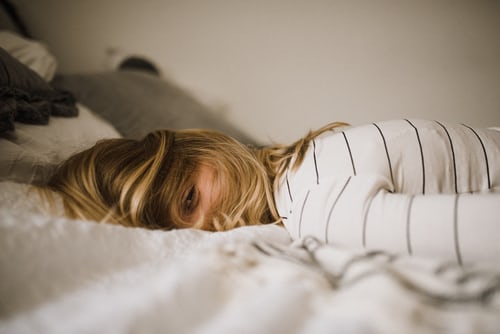Quality sleep has countless benefits for our bodies and minds. It can help us recharge our batteries after a tiresome day, improve memory and attention span, and even increase life expectancy. That being said, not everyone is able to enjoy the peace and tranquility of the recommended 7 to 8 hours per night. In fact, the disorders that millions of people around the world experience can cripple their health and induce chronic fatigue, high blood pressure, heart diseases, and more.
So, in order to wave sleepless nights goodbye and reacquaint our bodies with quality rest, here are 6 of the most common sleep disturbances and what you can do to remedy them effectively.

Snoring
This may sound caricatural, but loud and excessive snoring is one of the most disturbing nuisances there is. It is caused when air passes through the relaxed tissues of the throat, causing them to vibrate and emit harsh sounds. When a person snores uproariously, they can prevent their spouse, children, or even their neighbors from enjoying a good night’s rest. Now, while everyone snores every now and then, chronic snoring can sometimes indicate a serious, underlying health condition. To remedy this, you can try sleeping on your side to avoid pressure on your airways, using nasal strips, or in some cases, correcting any structural problem found in your nose with a quick surgery.
Wrong Temperature
If you often find yourself tossing and turning trying to find a position to fall asleep, chances are your sleeping environment is either too hot or too cold. This is your body’s natural response in telling you that the conditions are not conducive for proper rest. Of course, the act of switching positions can not only be bothersome for you, but also for your partner who’s trying to sleep next to you. If this is taking a toll on your romantic life, you’re bound to find a helpful article with some bit of research that will help you and your loved one enjoy comfortable nights together. Some sleeping adjustments may be in order! As a first step, achieve the ideal sleeping temperature in your bedroom, and witness the immediate improvement.
Irregular Sleep-Wake Rhythm
Our internal clocks, also known as the circadian rhythm, may also be subject to disturbances which can render a night’s sleep virtually impossible and impede on the person’s life. Here, the sufferer will have no clearly established sleeping pattern; they have no fixed nighttime hours, and their rest is merely spread out across irregular naps. This results in chronic fatigue and can make the person home-bound, incapable of attending to regular family, social, or professional duties. Treating this severe disorder involves activating the body’s natural clock to achieve regular sleep periods. Patients are usually prescribed vitamin B12, melatonin, and other sleeping aids, along with sleep hygiene education.
Insomnia
Whenever you’re experiencing trouble finding sleep, you may be suffering from insomnia. Stress, depression, irregular sleeping hours, hormonal changes, or medical conditions are often the cause of this common ailment, which comprise two types. One the one hand, short-term (or transient) insomnia occurs as a result of the stress of a traumatic life event. On the other, chronic insomnia is characterized by difficulties in falling asleep, experiencing non-restorative sleep, and the inability to maintain a healthy sleeping pattern for more than one month. In either case, the treatment involves both medication and non-medical remedies, such as hypnosis, relaxation techniques, or cognitive behavior therapy. Some lifestyle changes may also be beneficial, such as avoiding nicotine, caffeine, or alcohol.
Sleep Apnea
Obstructive sleep apnea is a sleep disorder characterized by the airways being suddenly blocked during sleep, which interrupts breathing and makes the person gasp for air, choke, and wake up from lack of oxygen. Loud snoring, obesity, poor sleep quality, and lack of energy can be the root of the issue. Thankfully, there are many proven solutions including continuous positive airway pressure (CPAP) therapy, which involves the use of a machine to keep airways open during sleep. Dental appliances, surgery, diet, or positional therapy may also help remedy sleep apnea.
Restless Leg Syndrome
Last but not least, restless leg syndrome is especially prevalent among the elderly. This disorder is described as an uncontrollable desire or urge to move your legs during rest, which can prevent you from having a good night’s sleep and wake you up intermittently. It’s commonly accompanied by aching and uncomfortable sensations along the lower limbs. There are a number of behavioral and drug-based therapies used to alleviate instances of RLS that have proven quite effective to date.
All things considered, while we all long for serene, rejuvenating night sleep, a good deal of disorders and conditions can prevent us from getting the rest our bodies and minds need. Remember that, if you ever experience any of these symptoms, you should consult with a medical professional to treat the ailment before it takes an even bigger toll on your life. Some general research won’t hurt, either!
I’m a 20-something stay-at-home mother and wife. I have an amazing husband, a beautiful daughter, two loving dogs, and a lazy cat. I wouldn’t change my life for anything! I love to read, listen to music, cook and blog!

Speak Your Mind